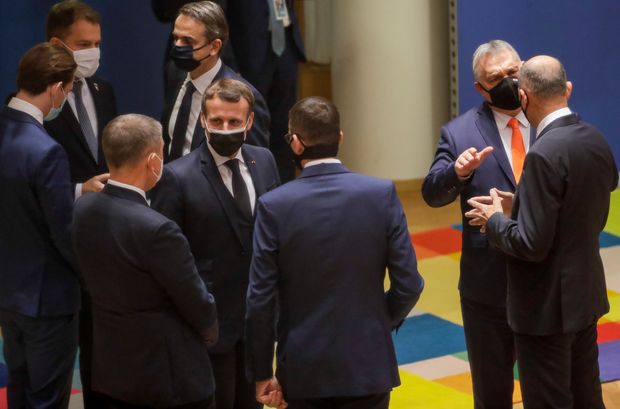
French President Emmanuel Macron, center, spoke with leaders of EU member countries at a summit in Brussels on Thursday.
Photo: Olivier Hoslet/Press Pool
The European Union turned up the heat on Turkey’s President Recep Tayyip Erdogan, with the bloc’s leaders planning to impose new sanctions on people involved in Ankara’s energy exploration activities in the eastern Mediterranean but stopping short of adopting broader economic sanctions requested by some of its member countries.
The compromise, approved by EU leaders at a Brussels summit, put a temporary end on fissures within the bloc over how to deal with Mr. Erdogan’s assertive military moves in the region and his push for energy resources in waters claimed by the bloc’s members, Greece and Cyprus.
However, the EU might have to reassess its own stance as President-elect Joe Biden’s administration is expected to take a tougher approach to Turkey, notably over its acquisition of an advanced Russian-made air-defense system.
The U.S. and the EU face a similar dilemma: How to contain Turkey’s aspiration to emancipate itself from the North Atlantic Treaty Organization’s shackles and become a more autonomous regional power, without pushing Mr. Erdogan into Russia’s arms.

President Recep Tayyip Erdogan says decisions to impose sanctions on Turkey wouldn’t be much of a concern to the nation.
Photo: roman ismayilov/EPA/Shutterstock
Thursday’s decision split the difference between calls by France, Greece and Cyprus for an overhaul of EU ties with Ankara, including a possible arms ban and the cautious approach of Germany, the Netherlands, Spain and others who favored minimal sanctions against a couple of officials.
The final decision on a sanctions list must still be taken but diplomats have said it could hit half a dozen officials involved in energy exploration and drilling and should be formally adopted in the next few weeks.
The EU in February sanctioned two officials from state-run energy company TPAO under a new sanctions regime adopted last year.
However, EU leaders requested the bloc’s foreign-policy chief to report back in March on relations with Turkey, warning that new measures could be taken if the situation deteriorates.
“Regrettably, Turkey has engaged in unilateral actions and provocations and escalated its rhetoric against the EU, EU member states and European leaders,” the bloc’s leaders said in their conclusions.
In recent days, Mr. Erdogan has dismissed the significance of sanctions, saying pressure from Turkey’s neighbors won’t persuade him to cede the country’s sovereign rights.
“Decisions to impose sanctions on Turkey wouldn’t be much of a concern to Turkey,” he said earlier this week. “The EU has never acted honestly. The EU has never honored its promises,” he said this week.
Relations between Turkey, a candidate for EU membership, and its European neighbors have grown worse in recent years despite a migration deal which has seen the EU spend billions of euros to help Ankara prevent Syrian refugees crossing into Europe.
Over the last year however, European worries about Turkey’s actions have sharpened over the nation’s intensified oil and gas activities and over what they see as Ankara’s growing regional ambitions.
French President Emmanuel Macron has clashed with Mr. Erdogan over Turkey’s moves to intervene more directly in the Syrian and Libyan conflicts and to support Azerbaijan in its Nagorno-Karabakh conflict with Armenia.
Greece and Cyprus have urged Ankara to stop searching for oil and natural gas in waters they regard as part of their exclusive economic zones. Turkey disputes that claim, saying it is conducting hydrocarbon prospecting in its own waters.
The offshore oil rivalry escalated this summer, when two rival warships from Turkey and Greece collided in a contested section of the eastern Mediterranean Sea, heightening fears that an open conflict might break out between the two NATO members.
Experts say the matter can only be resolved if the three countries reach maritime-delimitation agreements, amicably or through the courts.
In a sign of detente ahead of the EU summit, Turkey brought one of its oil-exploration vessels back to port last month, but left two others at sea.
With the Trump administration exiting office, Mr. Erdogan, who is straining to stave off a currency crisis compounded by the coronavirus pandemic, could face more pressure from Washington, especially from Congress.
Write to Laurence Norman at laurence.norman@wsj.com and David Gauthier-Villars at David.Gauthier-Villars@wsj.com
Copyright ©2020 Dow Jones & Company, Inc. All Rights Reserved. 87990cbe856818d5eddac44c7b1cdeb8


